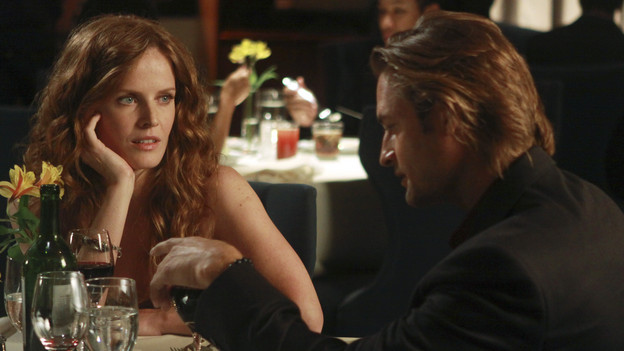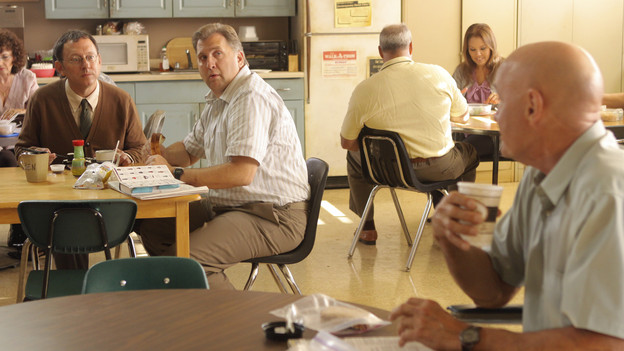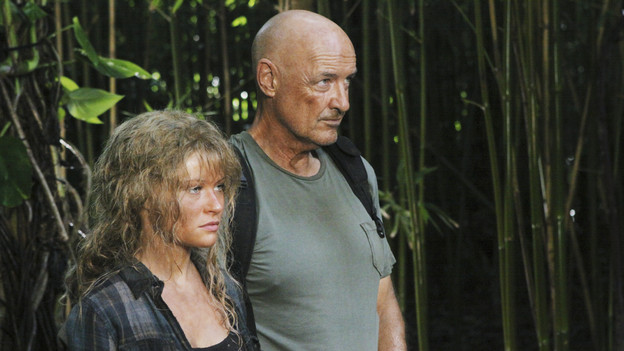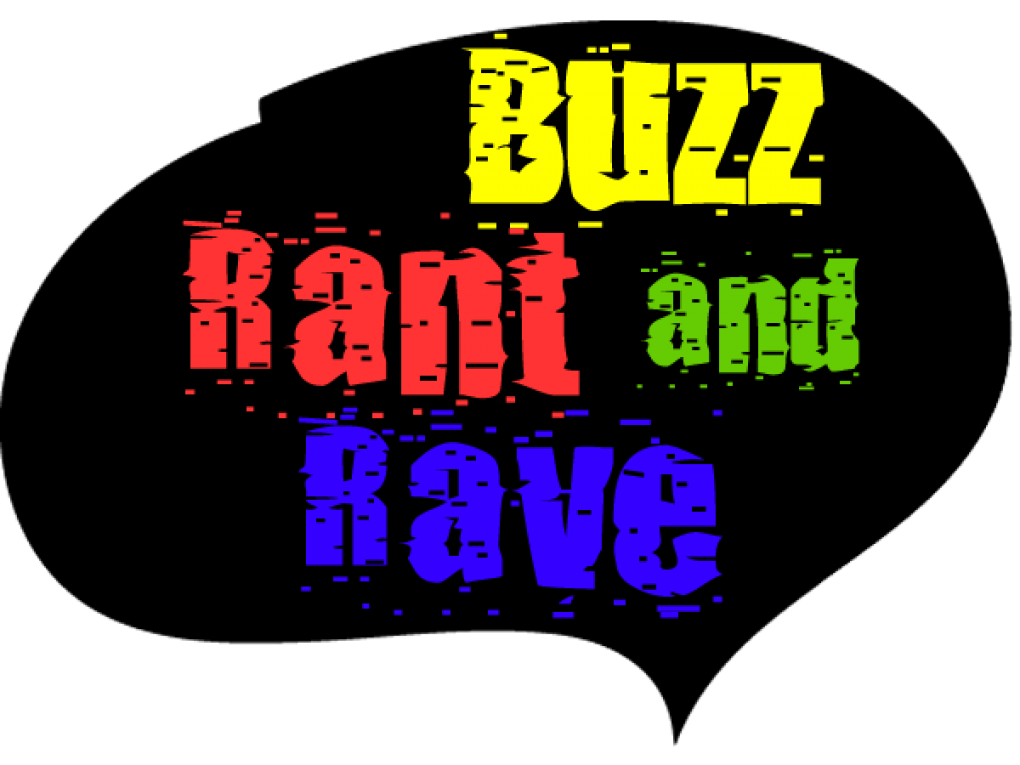Lost, “Recon” (season 6 episode 8)
How much a particular episode of Lost is enjoyable depends more than anything else, on who is the featured character. If it’s a Locke episode or a Ben episode, it’s likely to be good. If it’s a Jack episode or a Kate episode, I would lower my expectations — but not expect all of their feature episodes to be subpar. Matthew Fox is very good when he’s working with Terry O’Quinn, but Jack is less likely to be effective paired with other characters. (However, the Richard-Jack scene in last week’s “Dr. Linus” was wonderful.) Actually, pretty much every actor on Lost gives a good performance when paired with O’Quinn. He tends to bring out the best in his fellow actors. So the fact that O’Quinn’s Smokey the Locke is at the center of this season is good.
Break out your copy of Raw Power and continue on to spoiler country after the break

Author: Andrew Raff
What do you call Russian Roulette played with dynamite?
or Able was I ere I saw Elba
Lost – “Dr. Linus”
(season 6, episode 7)
What would Lost be without Michael Emerson? The man has a talent to deliver any line with a creepy smarminess (See him in a 1992 prison guard training video), but also for conveying deep and genuine emotion. Benjamin Linus killed his father and let his adopted daughter be killed in service of Jacob and the Island. And what for? Why did he make those sacrifices?
More questions and spoilers after the break

Monday TV
Chuck vs. the Beard
Chuck is a fundamentally silly show. Its version of international espionage involves many more “missions,” “secrets” and “being a spy” in 44 minutes than actual undercover operatives might use in their entire careers. But as the closest spiritual successor to Buffy the Vampire Slayer, it uses spy movie tropes to set the stage for stories that are allegorical. Buffy brought vampires, monsters and hellmouths to high school; Chuck brings James Bond to mid-20’s malaise.
Chuck’s second season paralleled stories in spy world with stories in Buy Moria, but the best episodes brought the two together. Just as Joyce Summer eventually learned about her daughter being the Slayer, this episode serves to further integrate Chuck’s spy life with his real life. While Chuck has become more of an ass as he’s used the Intersect 2.0 to become more of a spy (in particular, breaking up with Hannah), he’s fundamentally still a good person, who needs to talk about things with his friends and family. Unlike Sarah, Chuck has people close to him from whom he doesn’t want to keep big secrets (there’s that word again.)
One of the things that the show fixed from its first to second seasons was the character of Morgan. Josh Gomez dialed his performance down closer to human. Unfortunately, Morgan largely reverts to some of the overbearing nerd. Perhaps this was a conscious choice by first-time director Zachary Levi, or perhaps this was the character just freaking out when he learns that the Buy More is a cover for a joint CIA-NSA task force.
Although Office Space alumnus Diedrich Bader plays a twisted version of The Bobs and gives Chuck and Morgan a chance to have their biggest bromantic moment of the third season, it also plays against Jeffster performing CCR’s “Fortunate Son,” hand to hand combat and a Buy Moria take Iwo Jima.
How I Met Your Mother, “Of Course”
The second act of “Of Course” may have been this show’s single best act of the entire series. Realizing that breaking up Barney and Robin couldn’t just be a return to the status quo, HIMYM finally realized that the relationship did have an effect on the characters and that they couldn’t just go back to hanging out at McLaren’s together without consequences.
Fully integrated the heart and the funny. The emotional beats were cut properly with laughs, like Marshall’s song getting more involved each time we revisit it. And how can you not like an episode where Marshall punches the head off of a Stormtrooper and adds, “frankly, I’m still angry at the Empire”
Vinyl, CD and MP3
Now that I’ve ripped all of my CD’s into compressed digital formats in iTunes, I’ve acquired a turntable and started listening to more music on vinyl. As a listener, it’s nice to have a more active and physical connection with music. Hard disk-based libraries are wonderful for depth and variety, but for listening to the great albums that you love as albums, the album-centric listening experience is rewarding and engaging.
Instead of building a multi-hour playlist of digital music spanning dozens of genres, artists and albums across hundreds of songs, an LP listener has to flip after each side and can’t easily skip ahead from song to song. The medium forces more engaged listening.
But the LP is also an inferior medium to the CD and even compressed digital formats. The CD has tremendously more dynamic range. Dynamic range is the amount of sounds that can be reproduced from a recording– from the lowest note and softest volume to the highest frequency and loudest volume.
But today’s recordings are mixed and mastered to push the average levels as high as possible, using less dynamic range than the CD medium is able to deliver. Robert Levine published the definite take on the so-called loudness wars in a 2007 article in Rolling Stone, The Death of High Fidelity, “Over the past decade and a half, a revolution in recording technology has changed the way albums are produced, mixed and mastered — almost always for the worse.”
Pete Bilderback, Yo! Turn It Down!
“Dynamic range compression is not new. Producers of popular music have been using it for decades, and–used in moderation–it is actually an essential tool in producing good sounding pop and rock recordings. But over the past several decades producers, mastering engineers and recording artists have engaged in a race to create the loudest possible sounding CDs (the so-called “loudness wars”) and in doing so have severely restricted the dynamic range heard in today’s popular music recordings.”
Most modern music is seemingly optimized for listening in a 128 kbps MP3. Below about 192 kbps, MP3 files sound washed out, but above that are close enough to CD to be intistinguishable, except perhaps on truly audiophile equipment.
Music recorded earlier than the mid-1980s was not only mixed, mastered and produced to fit within the limits of the medium, but also recorded to sound best on the medium. While 2″ analog tape has a much wider dynamic range than an LP, did any artists not seek to make the best sounding LP possible?
Bob Speer, What Happened To Dynamic Range?
“What happened to dynamic range? That’s a question that should be asked of record labels, producers, artists, and last but not least, recording and mastering engineers. The question needs to be asked because we’re the ones responsible for what’s happened to our music. Much of the music we listen to today is nothing more than distortion with a beat. Great music is suffering because it lacks dynamic range. When music lacks dynamic range, it lacks punch, emotion, and clarity.”
Mastering for vinyl can be more artistic than mastering for digital because of the limitations of the medium. Kevin Gray, Producing Great Sounding Phonograph Records
Comparing the waverforms for the CD and LP versions of Bob Dylan’s Eyolf Østrem looked at the amount of dynamic range used by the different masters of the same album and concluded, Someone Please Fire Jack Frost. Even though the CD is capable of delivering a more dynamic representation of the music, it’s often end up delivering as loud of a delivery as possible with less dynamic range.
Given that digital formats are using less dynamic range than LP’s, and that analog distortion is warmer, more musical and more natural than digital clipping, the vinyl record is remaining relevant, because the inferior medium is used in a superior manner. The loudness wars are making modern digital recordings sound worse than records. Which is a shame, because properly recorded and mastered digital recordings are more dynamic. The deepest lows and highest highs that a CD can reproduce are higher and lower than those on vinyl, but for albums that don’t use all of that dynamic range, the warm sound and focused experience of listening to albums is more compelling for music fans.
Smoke in the temple, fire in the sky
109 episodes in, and only now am I going to start trying to write about individual episodes:
Lost, “Sundown” (season 6 episode 6)
“Sundown” certainly did not lack for action (or body count.) Sayid and Dogen fought in Dogen’s office, Smokey had some issues with the temple Others, Sayid settled some differences with Dogen and Lennon, while Ilana, Ben, Sun and Lapidus made it to the temple to save Miles from Smokey.
Spoilers continue after the break

The Legend of the Mustache
Fun promo video for Parks & Recreation:
Return to Craphole Island
Lost may not be the most popular show on television, but it may the most popular show with the highest percentage of extremely engaged fans. In other words, the product of the size of Lost’s fan base and their intensity has to be the largest for any television show. Dollhouse or Breaking Bad may have a higher percentage of extremely engaged fans, but a smaller audience. American Idol or CSI might have a larger audience, but their fans are less likely to know who the showrunners and producers are.
Is there any other show (aside from perhaps NBC’s promotion of The Marriage Ref from Executive Producer Jerry Seinfeld) where the showrunners would be giving interviews on late night television instead of anyone from the cast?
Or that EW refers to by their first names only? Doc Jensen, EW PopWatch, Confused by the ‘Lost’ premiere? Never fear! Damon and Carlton explain a few things about the start of Season 6 (SPOILERS AHEAD)
Lost may be the most thoroughly analyzed show on TV. Here is an incomplete collection of some of the reviews and analysis of the season 6 premier, LA X, parts 1 and 2: Alan Sepinwall Doc Jensen (EW), jOpinionated, Televisionary Mike Hale (NY Times), Noel Murray (AV Club), Drew McWeeny (HitFix), Mary McNamara (LA Times), Todd VanDerWerff (LA Times), Myles McNutt (Cultural Learnings), Isaac Spaceman (A List of Things Thrown 5 Minutes Ago), Maureen Ryan (Chicago Tribune), James Poniewozik (Time), Linda Holmes (NPR).
Time keeps on slipping
Now that President Obama gave the State of the Union address, the host chair of the Tonight Show is settled, Chuck premiered and Steve Jobs announced Apple’s new iPad, the Internets can finally fully devote attention to preparing for the most important media event EVER: the final season of Lost.
The Chicago Tribune’s Maureen Ryan interviews showrunners Carlton Cuse and Damon Lindelof in an epic three part interview.
As only he can, ALOTT5MA’s Isaac Spaceman recaps to this point: Welcome to the Hanso Island Resort and Spa
I’ve been re-watching season one, and I’m amazed at how different the show has become since then. Initially, this was a show about the characters who crashed on Craphole Island. As important as the various situations they encountered was how their reaction to those situations is affected by (or how the crash has forced them to reconsider) their actions in their lives before the crash. Since then, it’s gone on to be a time-bending show that’s grown in scope and added new characters with a connection to the island, who were not on Oceanic Flight 815 (and generally more compelling than many of the original characters.)
What most of the shows that have since attempted to be the next Lost seem to have forgotten is that Lost’s mythology is something that was introduced gradually over the course of the first two seasons. The first season was all about the characters from the crash; each episode focused on one character. If the show didn’t evolve from the first season, it would have become stagnant (like the early part of season 3.) If it started as the mythology-heavy show of later seasons, it may not have been around long enough to explore the mythology.
But over 5 seasons, the show has asked so many questions, that the final season will probably answer some questions that shouldn’t be answered and leave others open.
Myles McNutt, Cultural Learnings, The Scourge of Fandom: Why Lost Owes Us Nothing, “I tend to view fans who are basically threatening Lindelof and Cuse that they have to answer particular questions as the scourge of fandom. Lost is a show that very much invites fans to make their own theories, and I like that Lindelof and Cuse respect the audience enough to inspire their obsession. That’s why I find it disrespectful for fans to then take their theories and push them back on Lindelof and Cuse, as if the reason Lost’s mysteries exist is for us to solve them and then force the show to adhere to our ideas.”
James Poniewozik, Time: Tuned In Blog, My Favorite Episodes, and Yours
While Lindelof and Cuse expect to bring a satisfying conclusion that will end this show, Disney may want to do more with the franchise than just sell Dharma jumpsuits. What happens then? AfterLost? Lost: The Next Generation? Michael Schneider, Variety, Is ‘Lost’ here to stay?
Finally, Lost recapped by an extended Italian family:
Heavy Indicia
Igot invited to see a taping of The Late Show with David Letterman at the Ed Sullivan Theater last night. And aside from Dave being more engaged and energized by another situation involving the Tonight Show and Jay Leno over at NBC, this was incredibly worthwhile to attend, because The Heavy were the musical guest and rocked the house. As soon as the show wrapped, I was looking for their tour schedule to see if they were playing a full set later. Unfortunately, the Late Show wrapped up their US tour.
How often does Dave ask the musical guest to keep playing the song for another go round with the CBS Orchestra then vamping on the riff after the band finishes?
According to the Late Show website, it was “unprecedented.” They also have the full and complete encore performance
But sometimes when a band is just setting up, you get a feeling that you’re going to like them. If they’ve set up a four piece Gretsch drum set, Rickenbacker bass, Telecaster guitar through a Fender amp, baritone sax, tenor sax and trumpet, you get a sense of the sound they’re going to have. Combine with a British flag and before the band is even on stage, that’s a pretty solid indicator of the kind of sound they’re going to have. Borrow the Dap Kings horn section and execute well and there you go: a recipe for awesome.
The Heavy [theheavy.co.uk]
WXPN: The Heavy, Recorded Live In Concert (Jan. 15, 2010)
NPR: The Heavy: Dirty Basement Soul “Like the early White Stripes, The Heavy sometimes threatens to cross the line between reviving and archiving. Also like the early White Stripes, it’s good enough to get away with a lot, and smart enough to take full advantage.”
The House That Dirt Built: Vinyl CD
MP3
Late Shift 2: Electric Boogaloo
In the New York Times today, Bill Carter finds NBC Sports chairman Dick Ebersol clearly on Team Jay, saying,
“What this is really all about is an astounding failure by Conan.” Executive Leaps to Leno’s Defense.
But how much of Conan’s woes at the Tonight Show are caused by the creative failure of the Jay Leno Show at 10 PM?
Tucked away in this story from Joe Adalian at The Wrap is the one fact that I’ve been looking for, that Conan’s Tonight Show is actually outperforming Leno’s Tonight Show, when you account for the massive fall-off of lead-in: Ebersol: Conan ‘Chicken-Hearted, Gutless’ | The Wrap: “O’Brien’s down from the Leno era in the adults 18-49, losing Leno’s 15 percent advantage over Letterman. But local news numbers have dropped between 20 and 30 percent since Leno shifted to 10, which means O’Brien is actually not dropping as much as his lead-in.”
Even though Leno hosted the Tonight Show on a low-rated network last year, NBC’s slightly more creatively interesting 2008-09 schedule provided a much stronger lead-in to the late local news and The Tonight Show than the 5 night per week black hole of suck that is the Jay Leno Show.
But why do we care so much about The Tonight Show?
Firstly, it is the most established late night show and during the Carson era, it was the only late night talk show that mattered. Viewers have a relationship as much with the tradition and establishment of a show. Millions of Americans find something comforting about routine and being able to watch The Tonight Show while settling in to sleep. And given Leno’s popularity, we can only assume that for many people funny isn’t a necessary component of a comedy show.
Secondly, even though NBC is by far the least popular network of the four, it may still be the one with which television viewers have the most personal connection. NBC has a much more specific nexus with its location at 30 Rockefeller Center. Because The Today Show, NBC Nightly News, Channel 4 News, Saturday Night Live, Late Night and (fictionally) 30 Rock are all based there, there’s a feeling that NBC is an actual location with physical place and staff that all works together rather than a bunch of shows that happen to occupy the same frequency allocation on a transmitter. Secondly, more of its shows are long-running brands that have maintained the same core identity for so long that they have become institutions. Meet The Press is the longest running television show in worldwide broadcasting history, having been on the air continually since 1947. The Today Show has been on since 1952. The Tonight Show has aired continually since 1954. Saturday Night Live has aired since 1975 and Late Night since 1982. Only in two areas (evening news on CBS) and newsmagazine (60 Minutes)) do any of its competitors have longer running institutions than NBC.
Conan put his talk show up for sale on Craigslist.
What happened the last time NBC threatened to replace a Tonight Show host with another host from its network? In 1992, Bill Carter reported for the New York Times, Jay Leno Criticizes NBC On ‘Tonight’ Cliffhanger. We all know how that turned out.
It seems that Jimmy Kimmel is not a Leno fan. He did his Tuesday night show as Leno and then went direct as a guest on Leno’s show:
Myles McNutt, Cultural Learnings, Betrayal at NBC, Colon, What REALLY happened with my Late Night Show, Question Mark, by Conan O’Brien
Anne Helen Petersen, celebrity gossip, academic style, Team Conan: Nice Guys Finish First. Okay, well, kinda.
Lawrence Ebert, IP Biz, “The Tonight Show” controversy: do trademarks have a temporal dimension?. I’d say that since it has always aired after the late local news, The Tonight Show has come to mean NBC’s leadoff flagship and least-late of its late night shows.
James Poniewozik, Time Tuned In, Jay Leno: Seabiscuit or War Admiral
